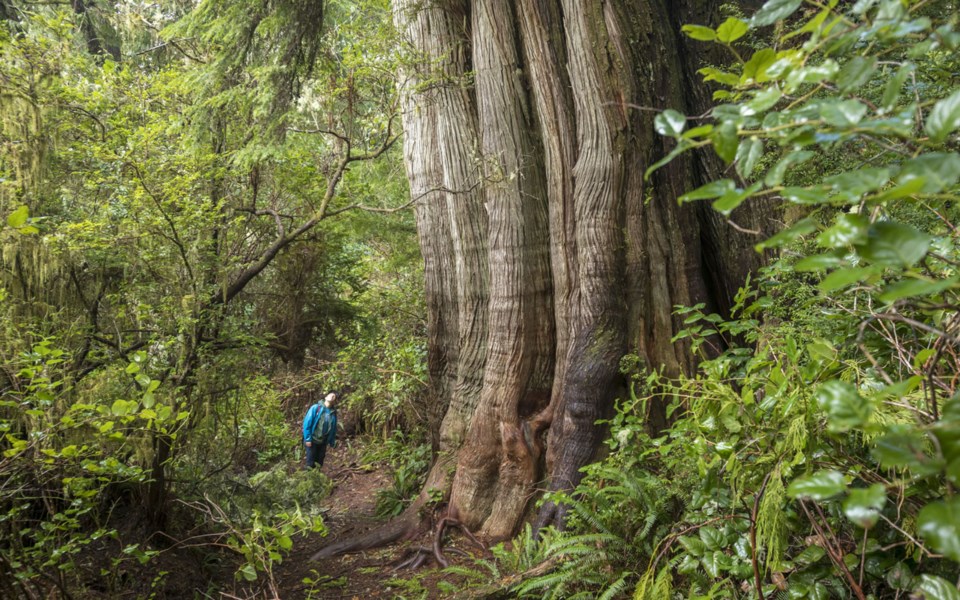Whistler is joining communities across the province to host a Forest March, along with other physically distanced activities, on Sept. 18 to advocate for modernizing rules around the way B.C. forests are managed.
Sabrina Hinitz, who’s on the board of directors for the Whistler Naturalists, came across the idea for community action in an email from the Sierra Club of B.C.
“I went to their website and saw that it aligned with all my beliefs here in Whistler,” Hinitz said. “I’m passionate about our forests and old-growth forest. Every time I see a 300-year-old tree driving down Highway 99 [on a logging truck], my heart breaks a little bit.”
She approached the Whistler Naturalists about hosting a march locally and the group supported the idea.
“Everyone is excited to have this opportunity to raise awareness both about the challenges facing communities across the province, as well as our own challenges unique to Whistler,” Hinitz said.
Overall, the marches are aiming to create change with the province’s Forest and Range Practices Act, ensuring “they include eco-system restoration, sustainable forestry, and meaningful community consultation about our forests,” according to the event description.
But, locally, the concern is largely around protecting old-growth forest, in particular, in the Cheakamus Community Forest (CCF), which is run by the Resort Municipality of Whistler (RMOW) and the Squamish and Lil’wat nations.
Last December, the CCF said its harvest plans for 2020 will be the same as 2019 with no harvest aside from wildfire thinning.
Forest manager Simon Murray told Pique at that time that while they intend to phase out the logging of old-growth in the CCF, it won’t be immediate.
The problem is younger parts of the forest are “all tied up in the carbon credits, so this is a real tough thing for us,” he said. “We really can’t go into these younger stands and start harvesting them yet, because then we wouldn’t be meeting our carbon sequestering targets.”
For her part, Hinitz would simply like to see an immediate end to the harvest of trees older than 250 years old across the province.
“The old-growth is being logged as we speak and it’s deemed an essential service during COVID, so it’s essential for us to protect it, too,” she said.
To that end, the walk will start at Lost Lake Park Beach at 1 p.m. with groups marching (physically distancing, wearing masks) on separate routes to the village. (Anyone who’s feeling sick or has been outside Canada in the last 14 days is asked to stay home.)
Speakers will talk about forestry in B.C. and the value of old-growth forests.
The event will also be streamed on Facebook Live. Those who can’t attend can also send in photos of themselves next to their favourite tree or wearing blue or green and share them to the Facebook event page (“Forest March BC —Whistler”) or email them to [email protected] to show their support.
“Musicians, artists, anyone who wants to be involved in any way can get in touch,” Hinitz said. “We’d love everyone’s help and support.”
Meanwhile, the Association of Whistler Area Residents for the Environment (AWARE) has been promoting the Sierra Club’s petition that calls for an immediate moratorium on logging old-growth forest.
It points out that only three per cent of B.C.’s old growth forests are still standing and more than 500 soccer fields of old-growth forest are cut every day.
“In Whistler, we’ve logged ourselves into a tinderbox because of all the logging that has happened here historically over the last 90 years,” said Claire Ruddy, AWARE’s executive director. “So we’ve lost a lot of our low-elevation old-growth forest. That means what we do have that remains, it’s really important we protect it.”
While AWARE participated in an independent panel that was reviewing the province’s old-growth review process, “we are still waiting on the outcome of that review,” she added.
The organization has long been working on this issue, but recent attention has started to give her hope, Ruddy said.
“I think what gives me hope is there are more and more people asking, ‘Why are we still doing this?’ That’s what I’ve seen change in the past 15 years doing this. I think that as with so many things, it comes down to people expressing their concern and with their elected officials, letting them know this continues to be important. That’s the only way we’ll shift the system.”
To see the petition, visit sierraclub.bc.ca/stand-up-for-the-last-remaining-old-growth-forests-bm-a.




